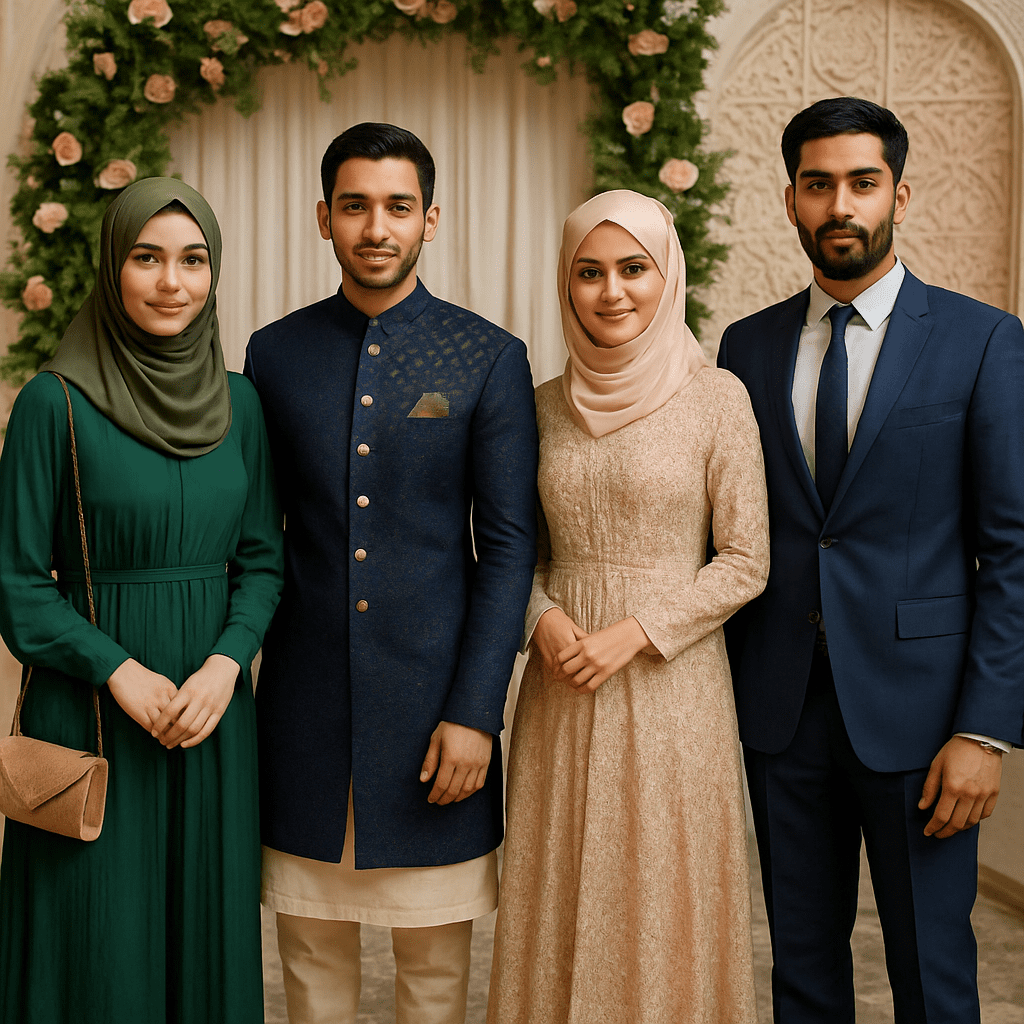What to Wear as a Guest to a Muslim Wedding: Modest & Stylish Guide
Attending a Muslim wedding is a beautiful opportunity to experience rich traditions, vibrant culture, and heartfelt celebrations. But if you’re invited and unsure about what to wear as a guest to a Muslim wedding, you’re not alone.
This guide will walk you through dress code etiquette, modest yet stylish outfit ideas, and cultural considerations so you feel confident and respectful.

1. Understanding the Muslim Wedding Dress Code
While Muslim weddings vary depending on culture—South Asian, Middle Eastern, African, or Western Muslim—the common rule is modesty. This applies to both men and women.
For most ceremonies, this means:
- Clothing that covers shoulders, arms, and legs
- Avoiding overly tight, sheer, or revealing outfits
- Choosing respectful colors for religious parts of the event
2. Women’s Outfit Ideas for a Muslim Wedding Guest
A. Traditional Options
- Maxi Dresses & Gowns – Flowy, ankle-length dresses in silk, chiffon, or satin
- Abayas or Kaftans – Elegant and modest, available in rich fabrics and embellishments
- Salwar Kameez or Anarkali – Popular for South Asian Muslim weddings
B. Styling Tips
- Pair with a light shawl or dupatta for added modesty during the religious ceremony
- Avoid deep plunging necklines or high slits
- Choose vibrant but tasteful colors like emerald, royal blue, or maroon for the reception
3. Men’s Outfit Ideas for a Muslim Wedding Guest
A. Traditional Styles
- Sherwani or Kurta Pajama – Common in South Asian weddings
- Thobe or Jubba – Preferred in Middle Eastern weddings
B. Western Options
- A formal suit with a tie in navy, grey, or black is acceptable, especially for less traditional settings
4. Colors to Wear and Avoid
- Recommended: Jewel tones, gold, silver, pastels, or soft florals
- Avoid:
- All-white outfits (reserved for the bride)
- All-black ensembles for the main ceremony (may symbolize mourning in some cultures)
- Neon or overly flashy prints
5. Accessories and Footwear
Women: Modest jewelry, clutch bags, low-to-medium heels or embellished flats
Men: Polished shoes, cufflinks, and watch for a sophisticated finish
Avoid overly casual accessories like baseball caps or flip-flops
6. Hijab Considerations for Female Guests
If you’re not Muslim, wearing a hijab is not always required—but during certain religious parts (like the Nikah), you may be asked to cover your head with a scarf.
Tip: Bring a lightweight, elegant shawl or wrap just in case.
7. Seasonal & Venue Adjustments
Outdoor Summer Weddings – Choose breathable fabrics like chiffon or cotton blends
Indoor Winter Weddings – Go for velvet, heavier silk, or layered looks
Destination Weddings – Research local customs if the wedding is abroad
8. Etiquette Beyond Clothing
Dress neatly and modestly
Avoid clothing with religious symbols from other faiths
Respect gender-segregated seating if present
Arrive early and greet elders respectfully
FAQs About Muslim Wedding Guest Attire
1. Can I wear a sleeveless dress to a Muslim wedding?
Not recommended. Opt for sleeves or add a shawl for modesty.2. Do I have to wear traditional Muslim clothing?
No, but modest and elegant clothing is appreciated.3. Can I wear makeup and jewelry?
Yes, but keep it tasteful for religious ceremonies; you can go bolder for the reception.4. Are jeans allowed?
No. Muslim weddings are formal events—dress accordingly.5. Can non-Muslim women wear a hijab?
Yes, and it’s seen as a sign of respect if required during religious moments.
Conclusion: Dress with Respect and Celebrate in Style
When deciding what to wear as a guest to a Muslim wedding, remember the golden rule: modesty with elegance.
By respecting cultural norms while adding your personal style, you’ll not only look amazing but also honor the special day. For a deeper understanding of Islamic wedding traditions and etiquette, you can read this comprehensive guide to Muslim weddings from Brides.com.
For more cultural guides and Islamic etiquette tips, explore Ehidayat.com. Azza in islam
